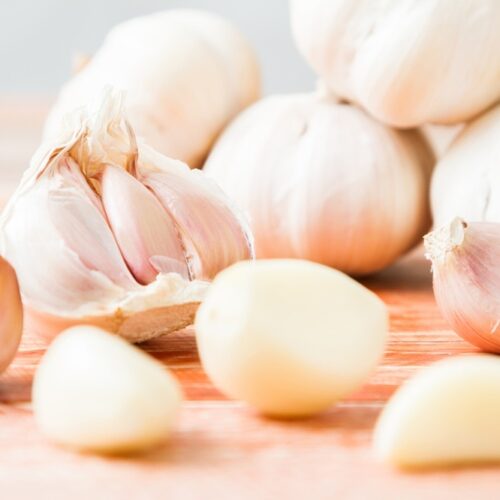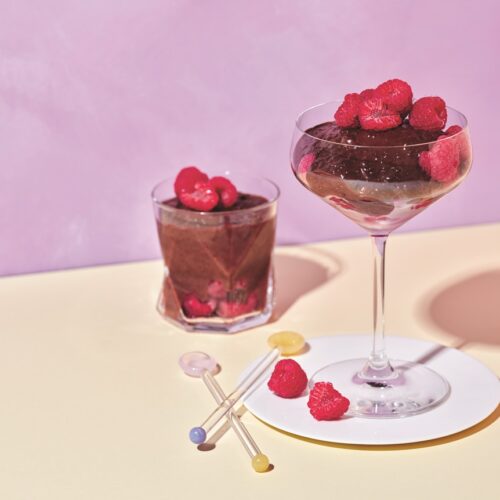
Dietitian Brooke Longfield shares some smart strategies to help you feel your best this Christmas — without having to give up on all the trimmings.
It’s normal to feel a little anxious about the silly season. Between all the shopping and socialising, healthy eating and exercise can fall by the wayside, leaving you feeling a bit flat and stressed. The good news is, a healthy diet will boost your energy levels and keep your mood steady, meaning you’ll probably enjoy Christmas much more. So this silly season, drop the ‘silly’ and stay calm, cool and collected!
Your Countdown to Christmas
Set aside time to…
Freeze meals for the next few weeks
Cooking and freezing a few dinners ahead of time means you have a healthy, home-cooked meal at a moment’s notice. You’re also less likely to rely on high-kilojoule fast food. Plus, with all those pressies to buy, your wallet will thank you too!
Eat to avoid illness
When you’re run down, it’s easier to catch a cold and pick up bugs. Keep your immune system strong by eating plenty of fruit and veges high in vitamin C. Add fresh or frozen berries to smoothies and load your dinner plate with an array of colourful veges such as broccoli, red capsicum and kumara.
Get a head start on Christmas shopping
Last minute shopping will send your stress levels soaring, so hit the shops early armed with a detailed list to keep you on track, and pack plenty of energising snacks and water. Zip-lock bags of high-fibre nuts and dried fruit will give you a burst of long-lasting energy.
Draw up a family schedule
Avoid diary clashes by noting on a calendar stuck to the fridge important events such as Christmas parties, end-of-school presentations and work deadlines.
Plan to…
Focus on regular meals
Grazing on chips and cheese at Christmas functions makes it all-too-easy to skip dinner and/or overeat. If you’ve already had a healthy dinner, or know one is waiting for you at home, you will be less inclined to gorge on salty, fatty snacks. Too many party snacks can add lots of kJ without filling you up, so you end up hungry (or ‘hangry’) afterwards. For sustained energy (and less irritability), include fibre-rich carbs, such as a bowl of untoasted muesli for brekkie, a sandwich on soy-linseed bread for lunch and a light dinner such as a vege stir-fry with brown rice.
Fill up on stress-free food
Certain nutrients may even help to lift mood: magnesium found in foods such as spinach, salmon and eggs, may reduce tension headaches and fatigue. Bananas, avocados and lentils are high in potassium, which helps lower blood pressure.
Drink sensibly
‘Tis the season to be jolly, but alcohol has a depressant effect on the brain. If you’re prone to the blues, Christmas isn’t the time to self-medicate with booze. Had too many drinks the night before? Instead of a greasy fry-up to recover, a healthier and equally satisfying choice is wholegrain toast topped with poached eggs, with plenty of water to rehydrate.
Spend time outdoors with family
There is a strong association between depression and a lack of vitamin D. Sunlight is our best source and luckily you can enjoy plenty of sunshine at this time of year. So take advantage of the longer days and go for a pre-dinner walk.
Get enough sleep
Studies show that even partial sleep deprivation causes stress, sadness and mental exhaustion. Alcohol is also known to disrupt sleep. So a few cocktail-laden, late night Christmas parties can leave you feeling less than spritely in the mornings.
Make sure to…
Plan your Christmas Day menu
While it’s tempting to go all out to impress guests, this isn’t the time to try labour-intensive meals. After all, nothing ramps up stress levels on Christmas Day like hungry guests waiting for dinner that should’ve been on the table hours ago! Keep the menu simple and save new recipes for a less stressful time of year. To keep the vibe relaxed and merry, ask family members to bring a plate and don’t be afraid to delegate.
Prioritise exercise
When you are busy, exercise is usually the first thing to drop off the list. But research shows exercise helps to improve mood and relieves stress. Your best bet is to go in the morning, when you have less time to make excuses. So, hit the pavement for a de-stressing power walk to bring out those exhilarating, feel-good endorphins. Studies say the benefits begin after just 5 minutes of moderate exercise.
Clear out the fridge
You’ll need the space for Christmas Day, so start decluttering by tossing expired packaged foods and using up old veges. Do a pantry stocktake and make a list of what you need to buy — you’ll be surprised at the amount of cinnamon/flour/dried herbs hiding in the depths of your cupboards.
Eat ‘fast food’ at home
It’s heating up outside, so spend less time around a hot stove by keeping meals light and simple. Omelettes, salads, canned beans and microwave rice are easy when you’re short of time. For more ideas see our 5pm panic! recipes.
Regift food gifts
Resist eating the mountains of chocolate and shortbread given to us at this time of year. Regift them to teachers, colleagues and neighbours.
On Christmas day
Take a moment to…
Start the day right
Don’t skip breakfast to leave room for dinner. A fruit and yoghurt smoothie combines energising B-vitamins with satisfying fibre to put a brake on overeating and keep energy levels in check.
Drink plenty of water
Instead of diving straight into alcohol at lunch or a champagne brekkie, sip on water to stay hydrated or make non-alcoholic mocktails for a hangover-free festive feeling.
Move a little
Rather than drifting off into a post-lunch food coma, do some gentle activity. You could go for a family stroll or take the kids to the park for a game of cricket to burn off some energy.
Enjoy the day
Christmas Day is a time to celebrate, which includes eating foods you would not normally eat. The key is to keep it to one day, and get back to your normal eating habits the next day. It’s only when Christmas becomes an extended festival of indulgence that all of our healthy intentions are derailed.
Be smart with leftovers
Christmas lunch leftovers can spur over-eating. Try portioning and freezing leftover meat. Store pudding and sweets in foil at the back of the fridge so you don’t see them each time you open it. Turn leftover roast veges into a healthy breakfast omelette, and defrost turkey breast for salads and sandwiches.
A recipe for success!
These are your summer essentials. They all promote energy and calm for a stress-free Christmas and a happy new year.
B vitamins
This group of vitamins helps your body to convert food into energy, so if you’re low in these you may feel lethargic and even depressed.
- Eat more kumara, wholegrain bread, eggs, milk, green vegetables and avocado.
Vitamin C
When you’re busy, it’s important to keep your immune system fighting fit. Some studies also show vitamin C can help reduce stress. Luckily, in-season fruit and veges are brimming with this antioxidant to keep you feeling your best.
- Eat more berries, broccoli, red capsicum, citrus fruits, kiwifruit and pawpaw.
Omega-3 fats
Eating healthy fats is good for brain function and good mood as research continues to show. In fact, people who eat high amounts of omega-3 fats, such as those in Japan and Norway, have lower rates of depression.
- Eat more salmon, tuna, sardines, walnuts, linseeds and chia seeds.
Carbohydrates
Low-carb crash diets can leave you feeling sluggish and glum. Eat carbs with fibre as they will keep your blood sugar levels stable, giving you sustained energy and warding off mood crashes. Carbs also release serotonin in the brain to help regulate mood and sleep.
- Eat more soy-linseed bread, rolled oats, chickpeas, baked beans, brown rice and lentils.
Magnesium
There are loads of potential benefits from this humble nutrient. It has been linked to improving sleep, promoting peaceful feelings, fighting drowsiness and easing headaches. So eat up!
- Eat more green leafy veges, broccoli, oranges, quinoa, nuts and yoghurt.
Article sources and references
- American Psychological Association. The exercise effect. www.apa.org/monitor/2011/12/exercise.aspx Accessed October 2015https://www.apa.org/monitor/2011/12/exercise
- Dinges DF et al. 1997. Cumulative sleepiness, mood disturbance, and psychomotor vigilance performance decrements during a week of sleep restricted to 4-5 hours per night. Sleep 20:267-77https://www.ncbi.nlm.nih.gov/pubmed/9231952
- Mental Health foundation (UK). Diet and Mental Health www.mentalhealth.org.uk/help-information/mental-health-a-z/d/diet/ Accessed October 2015https://www.mentalhealth.org.uk/
- NHS (UK). Food and Your Mood www.nuh.nhs.uk/media/11284/Food%20and%20Your%20Mood.pdf Accessed October 2015https://www.nuh.nhs.uk/
- Parker G det al. 2006. Omega-3 fatty acids and mood disorders. American Journal of Psychiatry 163:969-78https://www.ncbi.nlm.nih.gov/pubmed/16741195
- Penckofer S et al. 2010. Vitamin D and depression: Where is all the sunshine? Issues in Mental Health Nursing 31:385-93https://www.ncbi.nlm.nih.gov/pubmed/20450340
- Saxelby, S. 2012. Complete Food and Nutrition Companion: The Ultimate A-Z Guide. Hardie Grant Books: Australiahttps://www.hardiegrant.com/au/publishing/bookfinder/book/complete-food-and-nutrition-companion-by-catherine-saxelby/9781740668415
- Sleep Medicine at Harvard Medical School. Sleep and Mood. http://healthysleep.med.harvard.edu/need-sleep/whats-in-it-for-you/mood Accessed October 2015http://healthysleep.med.harvard.edu/need-sleep/whats-in-it-for-you/mood
- Stress Management Society (UK). Exercise. www.stress.org.uk/exercise.aspx Accessed October 2015http://www.stress.org.uk/
www.healthyfood.com











